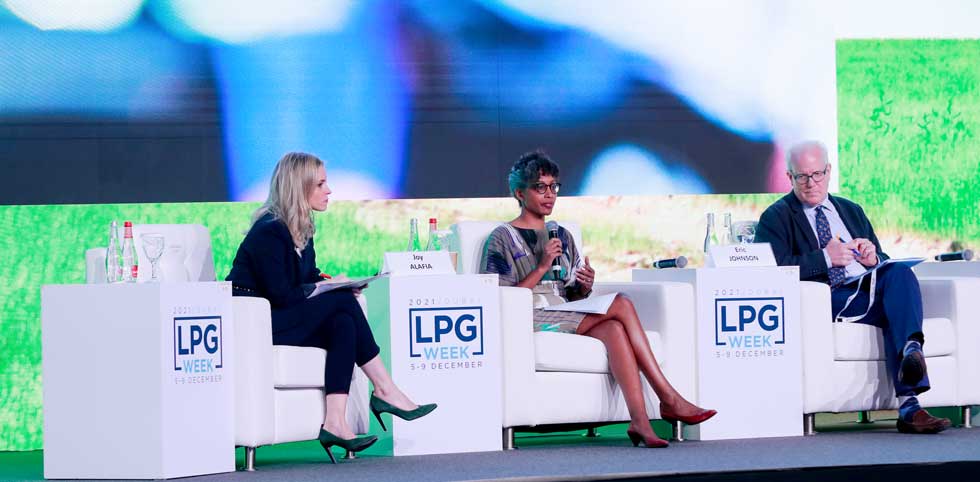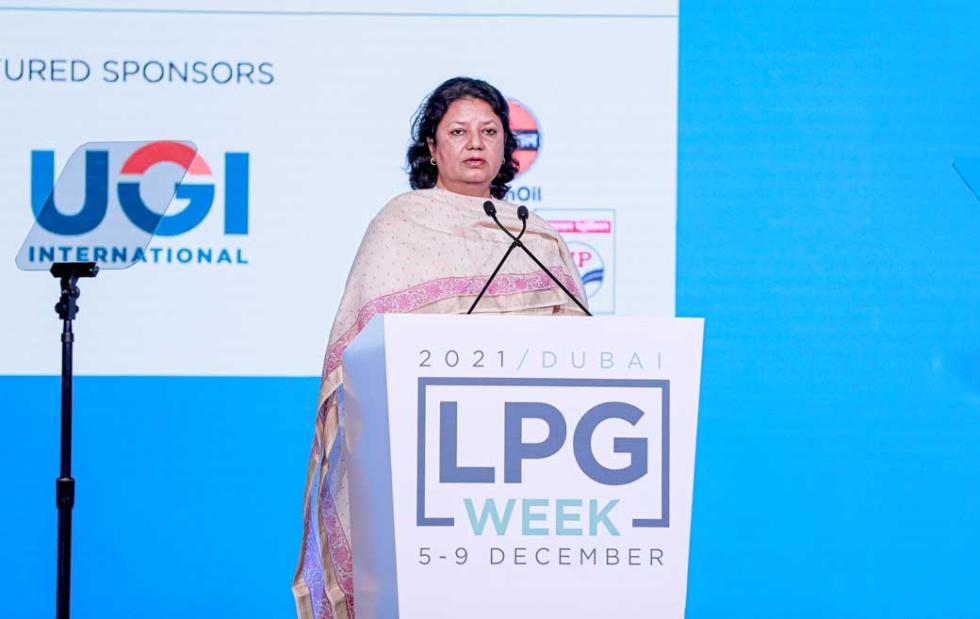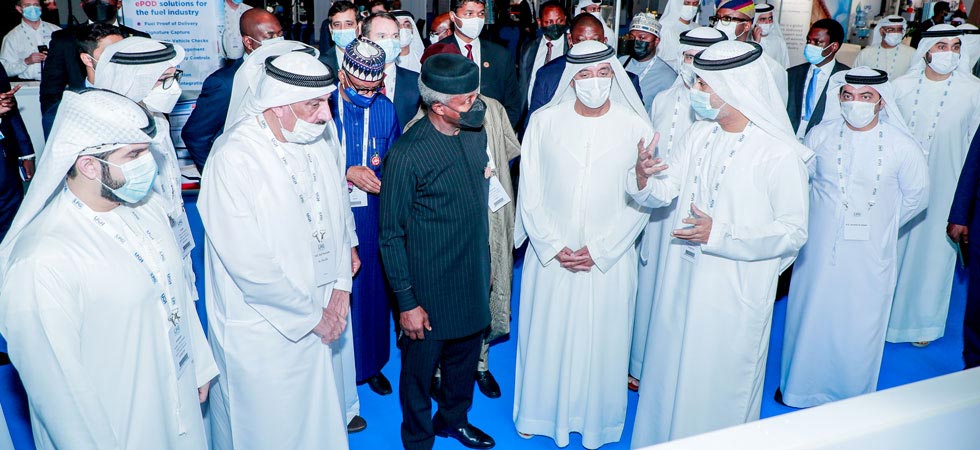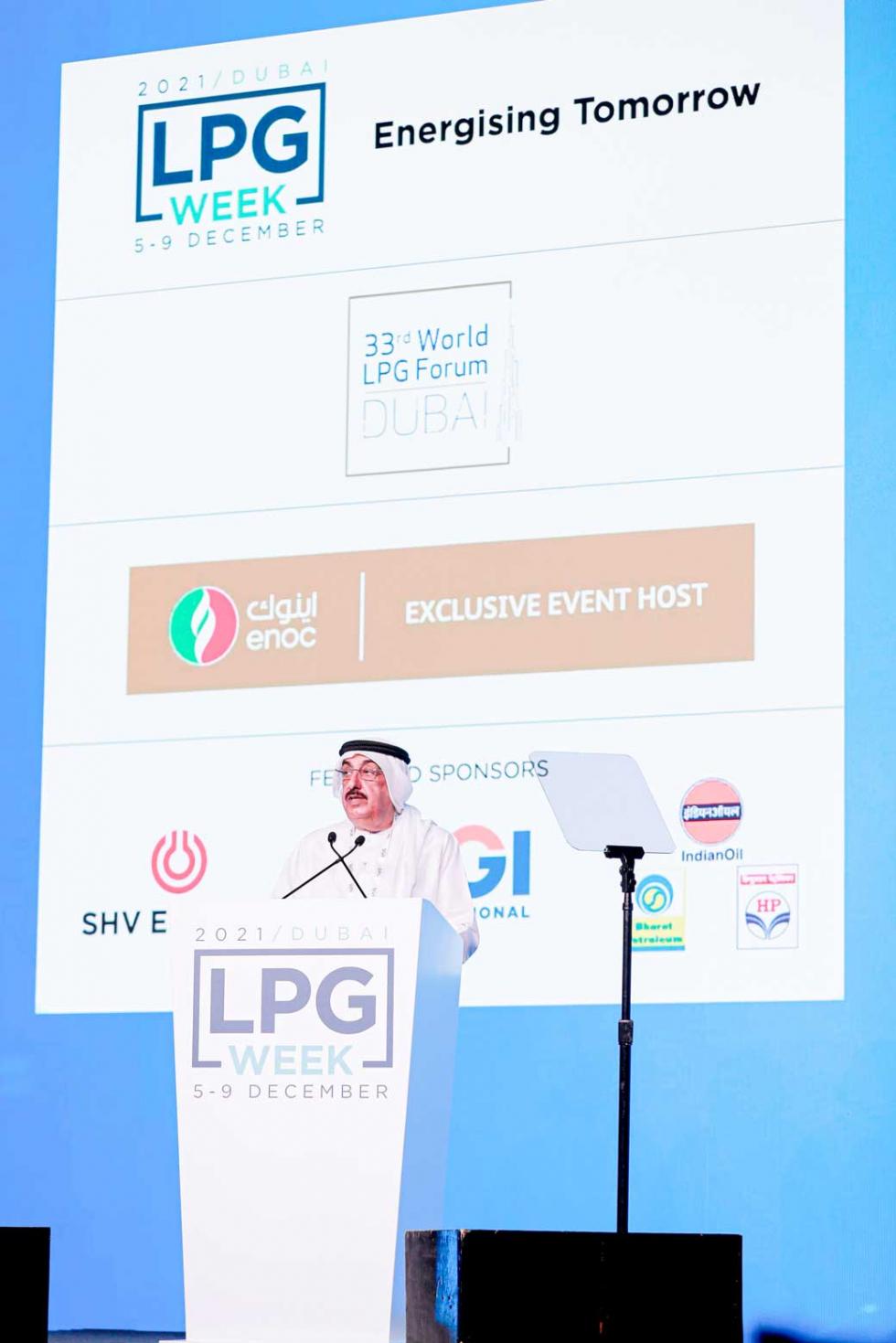
After a fully virtual event in 2020 as a result of the COVID-19 pandemic, members and guests of the World Liquified Petroleum Gas Association (WLPGA) reconvened at the organization’s first hybrid event in Dubai, United Arab Emirates.
Approximately 2,000 participants came together from 92 countries to attend the conference and hear from more than 80 speakers from propane industry companies, associations and affiliated organizations around the world. The conference, hosted by His Highness Sheikh Ahmed Bin Saeed Al Maktoum, took place December 5-9 under the theme “Energizing Tomorrow.”
James Rockall, managing director and CEO of the World LPG Association, the team’s expectations for attendance were exceeded, especially in the context of the current health crisis.
“The feedback received from in-person delegates was the fact that being back to face-to-face meetings was just incredible with of course the respect of the correct COVID-19 restrictions,” Rockall said. “The online attendees were extremely positive about being able to access to the sessions, learning and networking while not being on-site. The event platform offers many opportunities if in person attendance is not possible. LPG Week 2021/Dubai set the tone for a future of hybrid LPG Weeks organized by the WLPGA.”
 Key Themes
Key Themes
Outside of WLPGA member meetings and committee planning sessions, topics of conversation at the event ranged from coverage of current supply and demand in the global market to power generation opportunities to discussions around recent and in-process world government decarbonization legislation. Industry leaders talked about the need for “energy security” among the global population and the important role propane plays in providing reliable, affordable fuel for populations around the globe.
And with these discussions surrounding energy equity and government decarbonization legislation, it’s no surprise that several sessions throughout the week also focused on research and new initiatives related to renewable propane and renewable dimethyl ether (rDME) production.
“The industry is working closely together not only on developing renewable LPG production but also rDME. Oberon Fuels, Suburban Propane, SHV Energy are key members of WLPGA, which is embracing and coordinating these activities. The LPG industry considers rDME a very important component in its future renewable fuel offerings and the WLPGA members, together with the already mentioned pioneer members, are working together with dedicated working groups towards the same direction. The carbon intensity reduction that rDME can bring to the fuel offerings of the LPG industry is very significant,” Rockall said.
During a collaborative lunch session at LPG Week, leadership from SHV Energy, Suburban Propane and UGI Corporation discussed the increasing pressure to de-fossilize and how rDME can fill a need for sustainable, low-emission fuel for the LPG sector. SHV announced intentions to launch a joint venture with UGI to develop and supply rDME. The company has a goal of supplying 100% renewably sourced energy by 2040, and by the mid-2020s, SHV aims to supply several hundred thousand tons of rDME every year.
WLPGA’s Rockall said the introduction of renewable products in the LPG industry is an utmost priority and a prerequisite to take the industry by 2050.
“The outcome of the recent study presented, demonstrating that that by 2050, renewable LPG supply can meet at least 50% of non-chemical LPG consumption, even in the most-extreme scenarios postulated by energy authorities, is an excellent message, and this does not count yet any rDME that will soon be part of the portfolio as blend with LPG, which is already the case in North America with Oberon Fuels and Suburban Propane,” Rockall said.

Power Gen & Government-Industry Collaboration
While alternative fuels were the topic of the week, growth in power generation and how cooperation with governments, world environmental organizations and other groups will fuel upward momentum in the propane market.
“Power generation was always an LPG segment with high potential in the industry. Even if it may sound contradicting, the “electrification of everything” may offer additional opportunities for power generation with LPG since the demand for power will be increasingly difficult to meet and already unreliable in many areas. The maturing of relatively new technologies like fuel cells, largely showcased in the LPG Week, will bring additional advantages,” Rockall said.
To achieve these goals, cooperation and collaboration with government organizations will only help the industry. Rockall referenced autogas (which was covered in-depth at the forum’s Autogas Day at the end of the week — see a few insights below) as an immediate and viable option for governments to use to combat harmful emissions from gasoline and diesel vehicles.
“This is especially the case for countries with poorly maintained older fleets where tailpipe emissions are causing acute urban pollution. With almost 30 million vehicles globally running on autogas today, the case is already proven. Long-term support from government is one of the three key requirements for a successful autogas industry. The other two, a comprehensive refueling infrastructure and availability of vehicles, are there already,” Rockall said.
“The emergence of renewable LPG, as a medium/long term drop-in sustainable solution, makes the adoption of autogas a compelling choice for governments that want to act now to confront serious urban air pollution, and the health costs that brings. Autogas champions, such as Russia, Turkey, South Korea and Poland, are now being joined by Mexico, Italy and Ukraine as autogas is increasingly being supported by governments around the world,” he continued.
Autogas Day
In a session at Autogas Day, Atlantic Consulting Managing Director Eric Johnson discussed the importance of strategizing for growth in the regions/use cases where autogas — and for that matter, LPG overall — makes sense. He explained that the potential for a transition to autogas in a region or population where the electrical grid is powered predominately or significantly by coal as being much greater than the potential in a country or municipality, such as Switzerland, where much of the grid is powered by hydro or wind power.
Western Propane Gas Association CEO Joy Alafia followed up to this discussion with the sentiment that this is another opportunity to further conversations with public entities about why electrical energy should only make up a portion of the grid. She also stressed the importance of developing your message based on the population, environment, grid makeup, etc. of the area you are working in. In California, she said as an example, wildfires and the outages caused by the natural disasters create a case for not moving to electric vehicles.
“I’m very careful not to come across as anti- any energy source … What is missing from this conversation is the need for multiple power sources. … It needs to be a holistic conversation, and we have to break apart from these energy silos,” Alafia said.
Alafia also mentioned the inclusion of $7 billion in propane industry funding in the federal infrastructure bill recently passed in the United States, and how it will be used.
“A portion of it will be used for refueling infrastructure across the U.S. — $2.5 billion used on the country’s alternative fuels corridor; $2.5 billion is allotted for autogas school bus investment; and then $1.6 billion is for transit/low-emission vehicles,” Alafia noted.
Global Technology Conference
Held in conjunction with the event, the Global Technology Conference is an annual event held to showcase the technological advancements, innovation, and emerging research from around the world.
According to Nikos Xydas, technical director of the WLPGA, in January of each year, the WLPGA calls for abstracts of papers for the conference, which are accepted until late spring. A steering committee made up of WLPGA members evaluates the abstracts based on certain criteria, which include market potential, safety improvements, positive benefits to industry image, etc. The committee gives each abstract a score, which advances some entries to the finalist round. The list of finalists and their topics presenting at the event included:
- On-Purpose Renewable LPG Production presented by Dr. Keith Simons, principal scientist, sustainable fuels, SHV Energy
- rDME: Scaling Up Supply for LPG Sector Defossilization, Rebecca Groen, director of sustainable fuels, SHV Energy, and director, Circular Fuels Limited
- Propane-Powered Solid Oxide Fuel Cells for Backup, Offgrid & Portable Power, presented by Michael Edison, chief executive officer, Adaptive Energy LLC
- LPG Generation for Offshore Facilities: Collaborating with Chilean Salmon Industry to Reduce Environmental Impacts, presented by Claudio Córdova, transport development manager, Gasco GLP
- Hybrid Technology with LPG, Darin Moorman, vice president of innovation and business development, Moser Energy Systems
- Tech-Enabled Mico LPG Distributorships – A Way Forward to Boost LPG Consumption in Rural Markets, presented by Ashutosh Gupta, general manager, Bharat Petroleum Corporation Ltd, and Mahesh Jangam, Dy general manager, Bharat Petroleum Corporation Ltd
- Ultragaz 24/7, presented by Ana Elisa Vairo, development manager, Ultragaz
- LPG in a Digital World, presented by Fahd Awad Ibn Ateeq, IT applications director, National Gas & Industrialization Co. (GASCO)
- Energizing Digital Consumer Engagement, presented by Daniel Libralato, customer data and logistics analyst, Anova
 World LPG Challenge
World LPG Challenge
Also taking place at the event was the World LPG Challenge, a competition designed to seek fresh solutions to industry challenges from leaders working in the startup community. Live at the event, the challenge’s three finalists pitched their solutions and attendees had the opportunity to vote for the winner.
- James Atiti, co-founder and CEO of Doowegas, who presented the company’s mobile app that allows consumers to arrange for a gas cylinder delivery and pickup at their door. He noted that in Nigeria, the LPG market size is estimated to be around $498M and about 85% to 95% of LPG consumption is used for cooking. Safe use and consumption, as well as safe transportation and delivery, is a significant problem in the region, and Doowegas aims to solve alleviate safety incidents in both areas with its mobile app option. Through its use, each user can save about 1.4 pounds of CO2 on each gas station visit.
- Tinashe Khumbula, founder of Gas Village Ltd, unveiled a safety and compliance solution called Provenance Solution, which provides propane industry companies with a resource to check the origin, status and history of equipment used in the field. Any product registered on Gas Village has a traceable code attached to the cylinder, tank, or other equipment and products that provides information such as the recertification status and/or origin of the cylinder. Gas Village aims to provide safe transportation for all LPG users.
- Giacomo Benedetti, software engineer for Intactilis SRL, shared the company’s innovation in transport safety, which allows the delivery driver refilling a tank to immediately ascertain whether the cap or equipment has been tampered with or is in good working condition. SPINCap collects and analyzes data and guarantee the status of the tank and its contents. The IIoT tech is a watertight closing and access control system that includes detection, data acquisition, recording, administration and surveillance functions.
- Ellen Wang, CEO of SenTech, presented an innovation aimed to tackle driving fatigue in the industry. The company discussed the benefits of fatigue detection based on physiological signals. The in-vehicle monitoring system goes beyond facial and vehicle movements. The micro-feel smart ring uses micro-sensing and artificial intelligence to detect fatigue in delivery drivers before an accident happens. SenTech is also working on customization of music and media to, upon detection of driver fatigue, assist in making the driver more alert.
WLPGA Details Key Conclusions from the 2021 Forum
LPG Week attendees voted SenTech the winner of the finalist group. All of the finalists shared a cash prize of $17,000 as well as a complimentary pass at next year’s event.
- LPG not only a transition fuel but set to be part of the destination. According to H.E. Prof Yemi Osinbajo, vice president of the Federal Republic of Nigeria, “LPG is a fuel of the future; there is an optimistic future, and we will grow in a robust manner.”
- Renewable LPG can meet at least 50% of non-chemical demand by 2050. LPG is also an ideal fuel to support the journey to renewables. There have been exciting innovations in technology and swift movement in renewable LPG and renewable DME, demonstrating how quickly the LPG sector can move forward with the right fuel and the right partners.
- There are many roads to 2050. As the world moves toward net zero in 2050. Each country will have a different transition path, all technologies are needed, and LPG and renewable LPG have a key role to play.
- LPG proved to be an essential energy during COVID-19. Robust supply chains ensured demand was met across all sectors, demonstrating the resilience of LPG and the opportunities, according to David Appleton, vice president, LPG, Argus Media.
- This is going to be a decade of action and need access to clean cooking fuel. According to Guari Singh, deputy director general, IRENA, “We need both the molecules as well as the electrons, which means that gases, as well as electricity, will play in important role in the way our future will unfold in the energy sector.”
- There is an urgent need to humanize energy. The industry must humanize the energy transition, put consumers at the heart of the transition, engage with communities, and develop demand. The objective needs to be telling and listening, rather than selling.
Coming Up Next
While you’re planning for the upcoming year, mark your calendars for LPG Week 2022, held in New Delhi, India, Dec. 5-9, 2022. Next year’s theme for the event? It’s fitting — Humanizing Energy. Rockall noted that decarbonization and energy access will continue to be key topics of conversation at next year’s event.
“Under the theme “Humanizing Energy” the debates will focus more on the customer needs in the energy transition, although renewable LPG, renewable DME and other suitable renewable molecules will be hotly debated,” he said. “In terms of the global market, we hope that volumes will have returned to the pre-COVID-19 trajectory and the price volatility will have reduced, although this is dependent on many uncertain factors. We are in the last year of a three-year plan at WLPGA and we anticipate discussion around the outcome of this plan and the new strategic imperatives for the next three-year period.”


